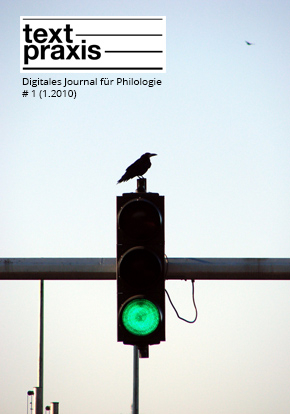Digital Journal for Philology

Textpraxis # 1 (1.2010)
In our first issue, Natalie Moser (Basel) looks into the interconnection of picture and narration in Wilhelm Raabe’s Pfisters Mühle, Dominik Schreiber (Mannheim) outlines a system-theoretical model of literary communication and Steffen Dürre (Rostock) questions sense and purpose of independent literary journals.
The relationship of literature and society can be seen as a text-external impetus and as a text-internal structural element in Wilhelm Raabe’s late text Pfisters Mühle. The question of the poetological relevance of the text is picked up in the text itself by showing the interconnection of question and potential answers via a narratively designed visual discourse. This visual discourse forms a model for a narrative self-reflection, by which the timelessness and updatability of the text can be seen. Pfisters Mühle can be understood as a form of poetological reflection because the text narratively investigates narration and is narration and metanarration at the same time. Simultaneously it is referred to the impossibility of a concluding meta-discourse.
Niklas Luhmann’s systems theory belongs to the integral parts of the theoretical inventory of literary studies. Anyway to literary studies the question remained open in what way the literary system guarantees its connectivity for communication in contrast to other systems. On the basis of Luhmann’s definition of communication, the article analyzes the complex operational mode of the literary system and its handling of information, message and understanding. The discussion of this problem, that literary communication is based on texts, leads to a new perspective on autopoiesis and selforganisation of the literary system. By this system-theoretical model it is explained firstly how the system maintains its operability in spite of constant threat of existence and secondly how it comes to the division into genres and epochs.
Steffen Dürre is co-founder and publisher of the literary journal Weisz auf Schwarz in Rostock. In his article on the ›Biotop literarischer Zeitschriften‹ he reports about the motives, tasks and possibilities of an independent literary journal and positions his project with regard to other intermediary instances of literature and within a confusing literary scene.
